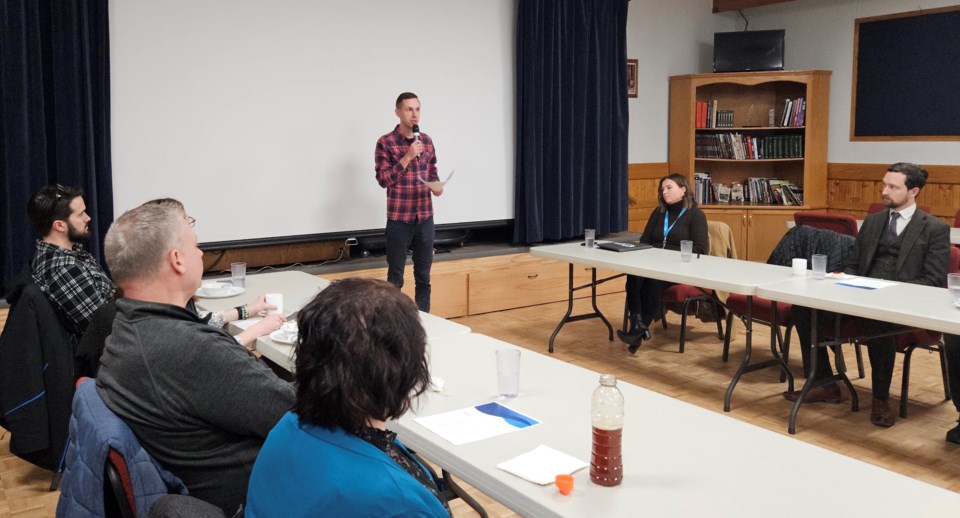WESTLOCK — Newly elected mayor, Jon Kramer, was given a warm welcome by the local business community Jan. 23, during the Westlock and District Chamber of Commerce first monthly meeting of 2024.
Kramer was invited as guest speaker and touched on several topics, including an introduction and background, his commitment to the town and its business community, and spoke about several items the town has been working on including the Rural Renewal Stream, changes to the land use bylaw, the non-residential tax incentive and a new economic development grants policy.
“I look forward to (receiving) your phone calls and communicating with you and figuring out how I and council can serve you guys as a chamber and as a community,” said Westlock mayor Jon Kramer, as he wrapped up his first presentation to the Westlock business community.
In providing some background, he noted “soft skills” as his strengths, which is what he brings to the role as mayor, noting “it’s about relationships and it’s about community,” he said.
Kramer also shared some of his priorities as mayor, including council alignment, focusing on administrative relationships and community building.
“We’ve got a real cohesive council. We like each other, we still challenge each other, we still disagree but we know how to pull in the same direction and give effective governance that way,” said Kramer, noting the good working relationship with administration.
Kramer spoke about his commitment to the community and business community using two words to describe the kind of mayor he’s going to be — responsible and responsive.
“Just know I’m excited to get your calls, I’m excited to solve your problems … that’s what your government should be doing. That’s what we’re committed to,” Kramer told chamber members.
Kramer also had two requests from the business community. One regarding their role in the upcoming plebiscite Feb. 22 and one about contributing to a new inclusive playground in Westlock, that’s being built this summer.
In his message about the upcoming vote on the flagpole and crosswalk bylaw, Kramer noted how it is “polarizing the community” and “that polarizing for business owners means risk.”
“(I’m) just trying to encourage everyone to understand this within the wider lens of inclusion as a whole. It’s easy to look at it as a single issue but when you come at it from a council perspective, it’s part of branding, it’s part economic development, it’s part of everything when we talk about being an inclusive community,” said Kramer, noting the recent actions of a small municipality in southwestern Ontario, the Township of Norwich.
It was the first municipality in Canada to pass a similar flagpole bylaw, limiting flagpoles to three government flags — municipal, provincial and national flags on municipal properties last May.
“They did this voluntarily as a council back in (the spring). Just this past week they repealed it as a council,” said Kramer, adding that although he didn’t know why they repealed it, he suspects it may be due the realization of the negative economic impact that decision had on the community.
“As a council we’ve been very committed that we’re going to encourage our community to run a Vote No campaign, as a council, but as a council, we feel this is a big enough issue that it has big implications on viability of our community,” he said adding that “we’ll find a way to work with it, if it goes the other way.”
He talked about what role the business community may have in the campaign and shared his own personal perspective as well.
“I think I can speak for council on this as well. If we want to be a community that is going to flourish, if we want to be a place where people feel safe and welcome, if we want to attract investment, development, if we want to retain positions, and skilled professionals, then a firm commitment to inclusion is the only way forward,” said Kramer. “When it comes to rural Alberta (and) towns our size, the viable communities are going to be the ones that take equity and inclusion seriously.”
He encouraged businesses to be on the “right side of inclusion” as he saw it, to give the community a fighting chance and pointed out consequences if the bylaw becomes law.
“Because this is a community-led bylaw, if this passes, council can never repeal it,” explained Kramer. “The only way this gets off the books, is after a one-year cooling off period residents, if they choose, can take up another position and bring it to council again. So stakes are quite a bit higher in this,” he added. “Again, my commitment is whichever way this goes, I’m not resigning, I’m not running out the door. I’ll do damage control, we’ll take care of the community, but we do think there’s a huge upside here, as being seen as an inclusive, forward-thinking community when (Feb.) 23rd gets here.”
The mayor wrapped up the meeting by speaking about the town’s first fully inclusive playground being built this summer in the northeast part of town. Kramer asked for the business community’s financial support and help, pointing out the town has budgeted $300,000 for the project.
“Inclusive playgrounds are expensive. In talking with administration, if we want the playground I think that the community deserves there, we got to get that number to $450,000 or so,” he said. “I’m going to be knocking on business community doors, reaching out to people. We’ve got to raise $150,000 and I don’t think it’s going to be hard,” said Kramer noting the “team effort” to build the playground will start with his family’s donation.
“It’s a playground that’s barrier-free … there’s something for everyone and it’s a prime spot in our community,” said Kramer. “It’s something that our community deserves. It’s how we understand all this within the wider lens of inclusion and having a community that works for everybody.”


